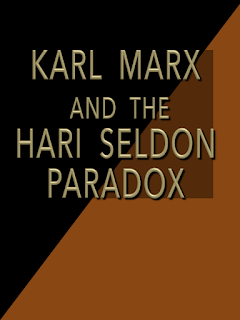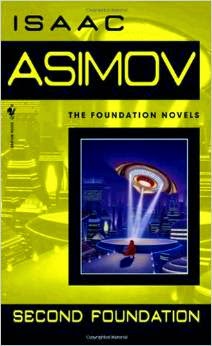Let's try looking back at the Foundation universe... which some of you have read... considering Isaac Asimov's sci fi classic in light of his acknowledged influences - Edward Gibbon, Adam Smith and Karl Marx... which I would venture almost none of you have read. Indeed, I am less well-read in those three than I ought to be, though I am very well-read in Asimov! And hence, let me attempt to do my main job...
...to be interesting. To offer perspectives you may find nowhere else.
== Isaac Asimov knew them all! ==
Fans of Asimov’s Foundation series often cite Isaac being inspired by Gibbon’s classic, The Decline & Fall of the Roman Empire, and of course that is apt…
... though in Foundation’s Triumph I point out that Asimov’s future Galactic Empire based on Planet Trantor has many traits that are more Chinese than Roman. Especially the way it is run by an all-powerful caste of eunuchs. (The robots obedient to Daneel Olivaw, who are sterile and loyal, but relentlessly manipulative, behind the scenes.)
But another inspiration deeply affected Asimov. Anyone doing historical musings in the first half of the 20th Century – and well into the second half – was deeply affected by the historiographic incantations and predictions of Karl Marx. Indeed, he was so widely read and so influential that notions of inevitable effects of technology on class struggle profoundly influenced Ayn Rand, for example!== Applying this to today ==
So what does any of this have to do with the politics of here and now? Both the confident prediction-incantations of Marx and the whole notion of psychohistory appear… well… kinda quaint to modern minds. Allowing us to shrug-off and even forget how compelling both were to both the masses and all wings of intelligentsia, a couple of generations back.
Well, there’s no room here for detail. Though there's plenty to discuss! (See "Class War and the Lessons of History.") ... Like how old Karl and his followers mapped out as ‘inevitable’ a series of events in oppression of an increasingly skilled working class whose resentment of owner-oppression could only follow one, ordained path.
Alas, having transformed himself over time (as Freud did) from brilliant researcher into a tendentious guru surrounded by acolytes, Marx came to believe incantations could overcome inconvenient human nature. It never seemed to occur to him that hundreds of thousands would actually read his books! And find them convincing. Convincing enough to decide to alter the apparently ordained path! Changing course through incremental, rather than sudden, reform.
Above all, Karl Marx never imagined that scions of wealth – Franklin Delano Roosevelt and his circle - would be persuaded to buy off the workers, by leveling the field and inviting them to share in a strong Middle Class, whose children would then (as recommended by Adam Smith) be able to compete fairly with scions of the rich.
It was a stunning (if way-incomplete) act of intelligence and resilience that changed America's path and thus the world's.
Among many mistakes, neglecting to consider that possibility was Old Karl's (and Lenin's etc.) biggest. Assuming that humanity is stupid and predictable is almost as dumb a glaring error as assuming that we’re smart!
Anyway, the Rooseveltean Experiment worked, far better than even its believers and enactors expected. For decades the US labor movement was hugely effective at counterbalancing the lords of wealth. Disparities hit levels lower than any great nation across history. And marginalized groups - races and genders - overcame resistance to enter the bargain. For a while, Marx seemed consigned to the dustbin...
Only now his tomes are again flying off the shelves, at almost every university on the planet. Why?
== He's baaaaack! ==
Why? Because our insipid world aristocracy is largely made up of buffoons and doomsday 'preppers' and inheritance brats whose addiction to flatterers has left them unable to read, let alone argue over the historical lessons of class taught by 6000 years of history. Or especially by the innovations of the Greatest Generation.
Show me one of today's oligarchs with the brains of that smart crook, Joseph Kennedy, who supported FDR for one reason:
"I'd rather be taxed half my wealth so the poor and workers are calm and happy than lose it all to revolution."
Any aristocrat who actually, actually thinks the R word is not on the table, amid his caste's all out war against not just labor but increasingly fed-up nerd professions, is truly too smug, too dumb and incurious ever to know or care what the word 'tumbrel' means, until he is riding in one. But it's a cart that can find its way even into deep, Patagonian prepper fortresses.
== So, is it a cycle? ==
A some of you know, I have a deep and abiding dislike toward yammers about so-called "cycles of history" like the insipid, recent Fourth Turning fetish that's so beloved on the lobotomized U.S. right. (That's okay, the mad left, while much smaller, has its own insipidities.)
What ... all cycles, Brin? Even one that is… predictable? Well, I will quickly grant that there are strong attractor states, the worst and strongest being feudal or monarchal pyramids of privilege, ownership and power that dominated 99% of human societies for at least 6000 years. A natural - if toxic - outgrowth from mammalian male reproductive strategies that have only ever been stymied in a few Enlightenment Experiments. Like ours.
And yes, as the younger (smarter) Karl Marx pointed out, capitalism can either follow the recommendations of Adam Smith and remain flat-fair-transparent-competitive-creative, or else... it will follow the far more familiar path of parasitism by cheaters... and decay back into a form of feudalism, yet again.
One of you (Paradoctor) put this ironic contradiction cogently, in light of the Rooseveltean Miracle that kept capitalism flat-fair, for a while...
“When the capitalist class takes seriously Marx's predictions of mass immiseration and political unrest, then they enact mixed-economy reforms to ensure the stability of the middle class, as insurance. The reforms work; while inconvenient to their exercise of lordly whim, they protect the owner families from revolution and Marx's predictions are falsified."
Paradoctor brought it back around to Isaac Asimov's grand thought experiment.
“This is an instance of Seldon's Paradox: that accurate psychohistorical predictions, once made known, set into effect psychohistorical forces that falsify the prediction.
"But the Paradox has more work to do. When Marx's predictions fail, then the capitalist class stops taking those predictions seriously. Therefore they stop supporting opportunity-uplifting semi-socialism and a flattened-fair social order, turning back to cheating to benefit their own inheritance brats. The reforms unravel, resulting in mass immiseration and political unrest, as Marx predicted."
In other words, what we are seeing now... a massive, worldwide oligarchic putsch to discredit the very same Rooseveltean social compact that saved their caste and allowed them to become rich... but that led to them surrounding themselves with sycophants who murmur flatteringnotions of inherent superiority and dreams of harems. Would-be lords, never allowing themselves to realize that yacht has sailed.
“So to the capitalist class, Marx is as true a prophet as he is a false prophet. Likewise for the Seldonian psychohistorian: when first stated, the prediction sets into motion forces that deny it; yet when the prediction is denied, the forces against it abate, and it comes true. Therefore to the society, the psychohistorical prediction is as confirmed as it is denied.”
What we're seeing, alas, is final proof that Adam Smith was right, as were the U.S. Founders who rebelled against dullard inheritance feudalism... as were subsequent reformers who had to ratchet forward those incomplete reforms, one grindingly too-slow step at a time.
We can and should(!) argue over the details! And the Seldon/Marx paradox will likely be with us for a long time... and even longer under AI-eunuch lords?
But the central conundrum remains: that rule by narrow aristocracies was always deeply stoopid across all of human history, a litany of bad governance, delusions and horrors that was only finally broken by the Enlightenment Attractor Alternative. An alternative that perhaps - across the galaxy - only humanity ever stumbled into... which may rank as a top explanation for the Fermi Paradox
The conundrum has a basic answer. Our path out of the age-old macho, feudal trap was (primitively) shown by the social contract generated by the Greatest Generation and the equalizing/elevating power of the GI Bill and civil rights and the drive to argue new reforms openly and fairly.
And hence, when you see would-be lords dissing that process, you must recognize the old, reflexively unsapient enemy of all our ancestors, all descendants, all sagacity... and all hope.

















